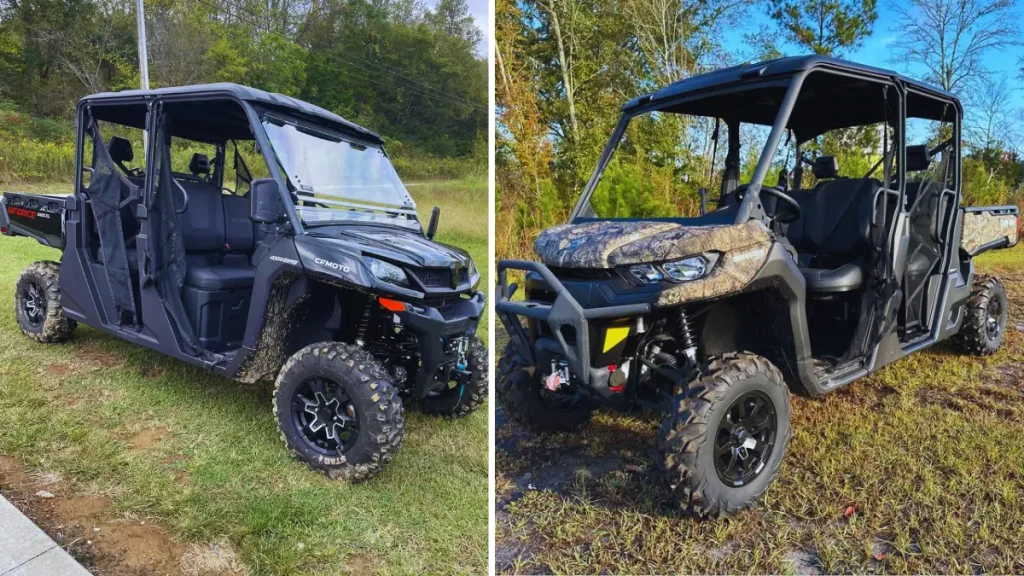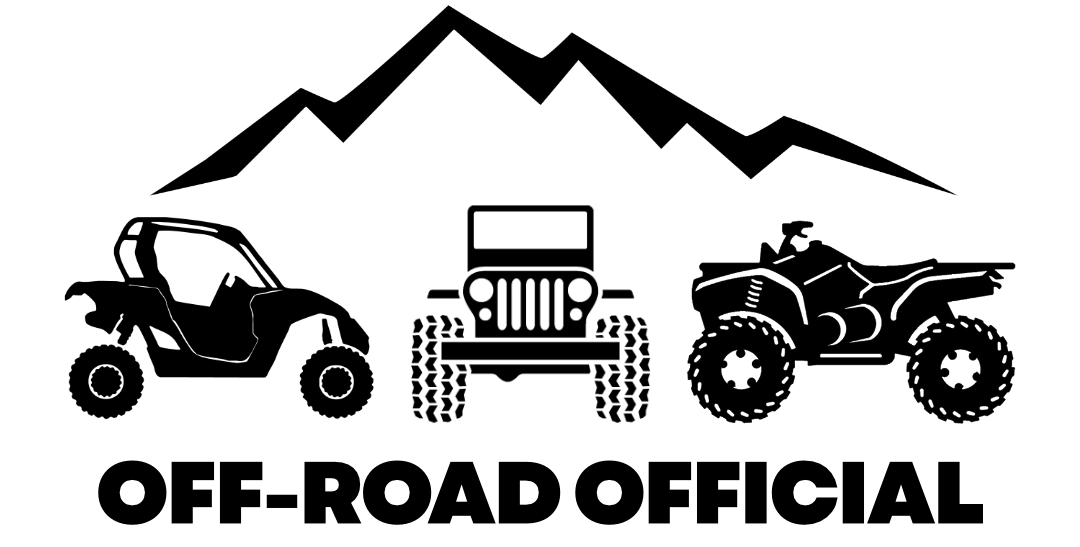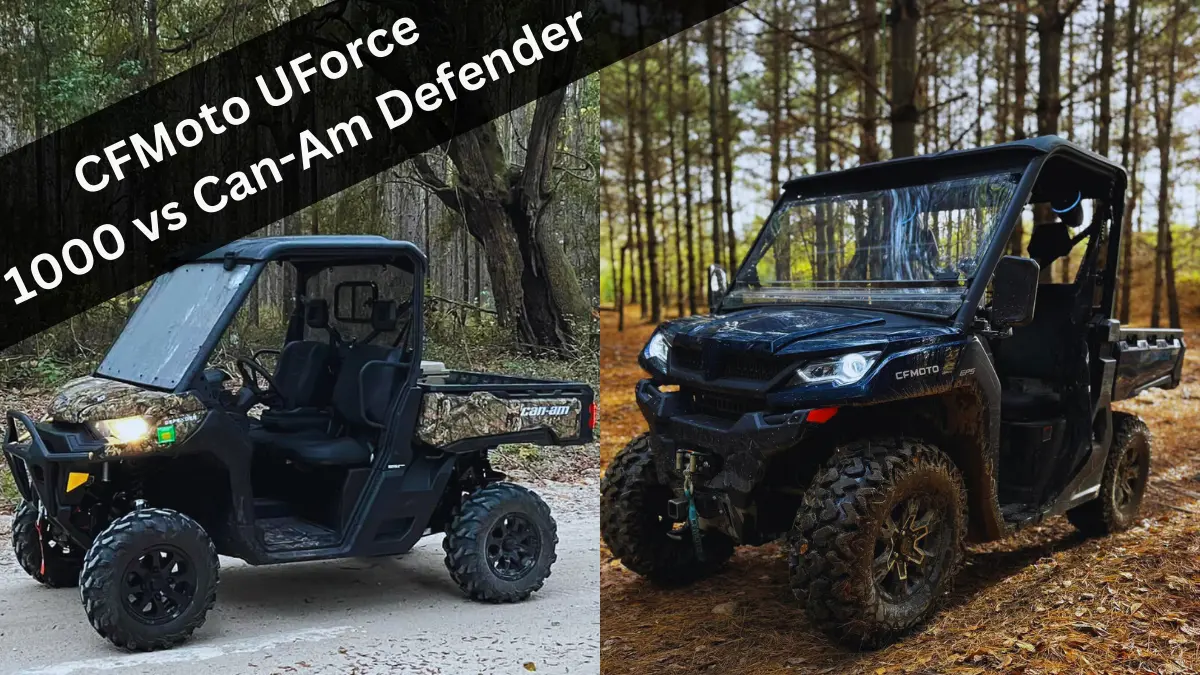It may be hard to believe, but the CFMoto UForce 1000 is now a direct competitor with the Can Am Defender.
A UForce 1000 review shows some recent changes to this model by CFMoto have really increased its overall quality.
And a UForce 600 review shows the same, bringing it close to a level playing field with some of the Can Am Defender HD7 models.
But while the CFMoto UForce 1000 and Can Am Defender do have a lot in common, there are also some key differences among these models to consider before deciding on which one makes the most sense for you.
This guide will review those differences and highlight which model has the advantage over the other in the following areas:
- Price
- Included accessories
- Acceleration and throttle response
- Locking differentials
- Turf mode
- Engine power
- Hauling and storage space
- Number of trim options
- Size and weight
CFMoto UForce 1000 vs Can-Am Defender HD10 DPS
If you read a Can Am Defender review, you’ll see that the Can Am Defender HD10 DPS (power steering) models are the most comparable to the UForce 1000 models.
So this guide will review the following models:
- UForce 1000 vs Can-Am Defender HD10 DPS
- UForce 1000 XL vs Can-Am Defender Max HD10 DPS

UForce vs Defender: 14 Key Differences
Big Difference In Price
The most glaring difference between the CFMoto UForce 1000 models and the comparable Can Am Defender DPS models are their prices.
The table below shows a price comparison based on their 2024 Manufacturer Suggested Retail Prices (MSRP):
| UForce 1000 | Defender DPS HD10 | |
| 2024 MSRP | $13,299 | $19,099 |
| UForce 1000 XL | Defender Max DPS HD10 | |
| 2024 MSRP | $15,299 | $21,399 |
As you can see, you’ll pay almost $6,000 more for the most comparable Can Am Defender model compared to what you’ll pay for either the UForce 1000 or UForce 1000 XL.
Advantage: UForces
More Included Accessories
CFMoto vehicles are known to include a number of accessories that come standard with their vehicles that are usually otherwise considered add-ons or included on specialty trims of other models.
And that’s the case when comparing the UForce 1000 vs the comparable Defender models as well.
The UForce 1000 models come with the following notable accessories, which are not included with the Defender models:
- Hard top plastic roof
- Side mirrors
- 3,500 lbs front winch (UForce 1000)
- 4,500 lbs front winch (UForce 1000 XL)
And there are also twelve very popular CFMoto UForce 1000 accessories that can be added to make these vehicles even better, along with thirteen popular Can Am Defender accessories specific to that line.
Advantage: UForces
So you get a machine for $6,000 less in either of the UForces that also include some pretty important accessories that the Defenders don’t.
So why even consider a Defender over a UForce?
Well, there are a number of areas the Defenders simply outshine the UForces.
But there are other areas that the UForce offers advantages as well.
Acceleration & Throttle Response
One of the biggest differences in these two models comes down to the initial acceleration and throttle response at speeds slower than 15 mph or so.
The UForce 1000 models have always been plagued by a jerky ride at lower speeds, especially when it comes to their initial acceleration from a stopped position.
Much of this comes down to UForce 1000 clutch problems that still exist in current models but have seemingly been minimized in recent years, where the throttle response is so touchy that even the slightest pressure on the gas pedal can result in the vehicle jerking forward.
On the other hand, the Can Am Defender’s initial acceleration and throttle response is silky smooth.
And not just at lower speeds and starting from a stopped position, but the Defender models offer excellent throttle response and a smooth ride throughout the entire RPM ranges.
Advantage: Defenders
Manual vs Auto Locking Front Differential
The front differential can be locked on both models to give both of them full 4WD lock for added traction.
But you have more control over the locking differential in the UForce 1000, as you have the ability to manually determine when it fully locks via a switch on the dash.
On the other hand, the Defender models are equipped with Can Am’s ViscoLok auto-locking front differential feature, meaning you can’t automatically lock the front differential manually.
The ViscoLok system will automatically determine when the front differential locks to give you full 4WD, which gives you less control.
Advantage: UForces
One Has Turf Mode, One Doesn’t
One of the biggest knocks on the CFMoto UForce 1000 is that it lacks an unlocking rear differential, so you don’t have a Turf Mode with these models.
The Can Am Defenders all feature a manually locking and unlocking rear differential so you can throw them in Turf Mode whenever you want.
Without Turf Mode, you run the risk of leaving tire marks on your driveway or tearing up your grass when turning sharply in the UForce 1000 models.
Advantage: Defenders
Which Has The More Powerful Engine
The two engines used in these models are very similar, but also offer some differences.
The Defender’s V-Twin engine offers a displacement of 976cc compared to the slightly smaller 963cc in the UForce 1000.
This slight difference results in a max power output difference of three horsepower for the UForce, which is so minimal you can barely tell when driving the two.
Both engines are quieter than you’d expect in the cab, so you’ll have no problem hearing your passengers while accelerating.
| UForce 1000 | Defender HD10 | |
| Cylinders | V-Twin | V-Twin |
| Displacement | 963cc | 976cc |
| Horsepower | 79 HP | 82 HP |
Advantage: Defenders
Flip-Up Rear Seats
The UForce 1000 XL offers good rear storage areas under each of the rear seats.
But the Defender offers rear seats that actually fold up like you’d find in the rear of a Ford F150 Crew Cab.
This gives you added floor space in the Defender models and the ability to store and haul a good bit more gear or cargo than you can in the rear row of the UForce 1000 XL.
Advantage: Defenders
More Underseat Storage
Both the UForce 1000 models and Defender models offer a good bit of storage throughout the cab areas.
But while the Defender models offer the benefit of flip-up rear seating to offer more floor space, the UForce models offer more combined underseat storage.
The UForce models offer a small storage cubby under the front middle seat, which the Defender models don’t have.
But both models do have a good bit of storage under both the front driver’s and passenger’s seats.
Additionally, the UForce XL offers multiple storage compartments under the rear row seating, while the Defender Max’s rear underseat storage is more limited thanks to the fold-up seats.
Advantage: UForces
One Offers A Passenger Grab Bar
Another nice feature that sets the Defender models apart from the UForce is a passenger grab bar situated on the dash that both the right and middle passengers can use to brace themselves.
It may not seem like a big deal, but when you’re out on the trail or riding through steep terrain, even with your seatbelt on it’s nice to have the grab bar to help brace yourself and hold on to.
This is especially true if you’ve got kids who often ride with you.
The UForce 1000 models don’t offer any sort of grab bar, which gives the Defender models an advantage here.
Advantage: Defenders
Digital Displays
The two digital displays are also quite different, with the UForce models offering a larger and more modern color display that almost resembles a mini TV screen and comes with a Bluetooth call indicator.
The Defender on the other hand offers a much more basic digital display that is less modern and won’t show you quite as many indicators or gauges.
That said, there’s more difference in the styling than anything as both displays will show you everything you’d want to see from a gauge and indicator perspective.
Advantage: UForces
Reverse Lights
The UForce 1000 models each have a set of Reverse lights in back, which are quite underrated and help to set them apart in the industry as they’re not all that common.
These Reverse lights activate just like they would on any automobile, but they emit a bright white light from the rear that gives off plenty of light to be able to see where you’re backing up in the dark.
The comparable Defender models don’t offer this feature.
Advantage: UForces
Number Of Trims To Choose From
One of the bigger differences in these models is the number of trims you can choose from.
There is only one trim for each the UForce 1000 and UForce 1000 XL, while the Can Am Defenders offer a total of 21 different trims between the three-seater and six-seaters in 2024.
Advantage: Defenders
Ground Clearance
The CFMoto UForce 1000 gets just slightly more ground clearance than the comparable Can Am Defender models.
| UForce 1000 | Defender | |
| Ground Clearance | 11.4 inches | 11 inches |
As you can see, at only .4 inches more the difference is minimal, but you do have just a bit more room of clearance with the UForce.
Advantage: None
Size & Weight
The UForce and Defender models feature slightly different dimensions and weights as well.
The UForce 1000 is about 5 inches shorter in length and height.
The Defender features just a slightly wider width of 64 inches, which is actually somewhat noticeable when looking at the two side by side.
This difference mainly has to do with UForce’s tires being located slightly more inward than those of the Defender, which gives the Defender a slightly wider stance as well.
Some would argue this makes the Defender just a hair more stable, but the difference is so minimal it’s hard to get onboard with that argument.
Their weights are just about the same as well.
| UForce 1000 | Defender | |
| Length | 116 in | 121 in |
| Width | 63.5 in | 64 in |
| Height | 73 in | 78 in |
| Weight | 1,520 lbs | 1,558 lbs |
Similarly, the UForce XL is about 10 inches shorter in length than that of the comparably Defender Max DPS model.
The six-seaters feature the same difference in width and stance as the three-seaters, but are almost identical in their heights and weights.
| UForce 1000 XL | Defender Max | |
| Length | 148 in | 158.3 in |
| Width | 63.5 in | 64 in |
| Height | 78 in | 79.5 in |
| Weight | 1,808 lbs | 1,793 lbs |
Advantage: None
Which Model Is Fastest
The Can Am Defender HD10 models offer a top speed of around 66 mph.
A comparison of the Can Am Defender top speeds shows that while an electronic speed limiter restricts the HD10’s top speed, it’s still one of the fastest side-by-sides in the industry.
For those who have opened it up in a UForce 1000, you may be thinking that the speedometer showing you going around 75 mph means this model is faster than the Can Am Defender.
But you’d be wrong, as a review of the UForce 1000 top speed shows that its top speed is limited to 65-66 mph in stock condition and that your speedometer likely needs to be calibrated if it’s showing you going much faster than that.
Advantage: None
Final Word
It’s hard to argue that the UForce 1000 models aren’t far and away the better deals in my opinion.
But it’s also hard to argue that you aren’t getting a slightly higher overall quality vehicle in the Can Am Defender if you’re good with paying up.


